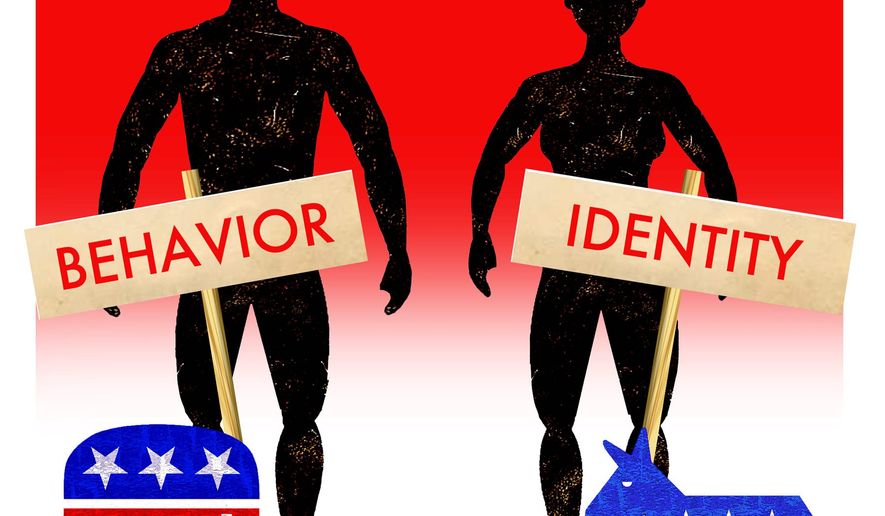OPINION:
Dear Mr. Piper: November 6 is election day. Four years ago, you couldn’t have convinced me to vote for a Democrat if you had tried. To me, the LGBTQ agenda was just too big to ignore. However, I have come to realize that creating laws against these things is not the solution. We have to operate within the framework that we are in. As Christians, our job is to love others, not legislate against them.” Signed, Compassionate Chris
Dear Chris: I am not Dear Abby, but let me give this a try.
I have to start by pointing out a major flaw in your logic. Even Gore Vidal understood the glaring difference between behavioral choice and personal identity when he famously said, “there is no more such a thing as a homosexual person than there is a heterosexual person. These are behavior adjectives.” The present debate over sexuality is not about personal identity, but rather about personal behavior, pure and simple. Those who argue differently are employing a non sequitur fallacy to the extreme.
A non sequitur is an argument of non-connection, where your conclusion does not logically flow from your premise. In laymen’s terms, it is a fallacy of “So what?” Let me offer a couple of examples. If my actions are hateful and I cite my proclivities or feelings as justification for my hate, your logical response should be “So what?”
If I cheat on my wife and I justify it by saying that all males are genetically inclined to be cads, your common sense should lead you to ask “So what?” If I am angry all the time and I say I am biologically predisposed to this emotion, you would be well within your rights to respond (or at least think to yourself) “What does that have to do with anything? So what! Control yourself!”
You see, in all these cases, it is behavior that is in dispute — not identity. Minority status has never been about one’s proclivities, instincts or desires. To the contrary, it has always been a matter of who you are — not what you do (or what you want to do). Sexual desire or inclination can never be the justification for anyone’s claim to minority status. Otherwise, why wouldn’t those inclined toward polygamy, bigamy, incest and a host of other behaviors be as justified in demanding minority status as any other sub-group?
Next, let’s address your claim that, “We have to operate within the framework that we are inThe solution is not to legislate against it.” The simplest way for me to respond is to ask a question. Should William Wilberforce have responded the same way to the British slave trade? How about Martin Luther King Jr.? Should he have just accepted the given framework of the day and not sought any legislative solutions to injustices of his time?
How about Lincoln and the Emancipation Proclamation? I could go on and on, but I think my point is clear: History is replete with stories of leaders rising up against things viewed as immoral and wrong and working to correct such things through legislative action. Frankly, the argument that you can’t legislate morality is a bit empty, for all legislation assumes some common morality. Otherwise, the entire process would be meaningless.
Finally, I can’t resist responding to the underlying assumption to your argument. You seem to imply that the traditional restrictions on sexual behavior are synonymous with being “unloving.” Aren’t you being just a bit cavalier regarding the principles of physical health, personal responsibility, interpersonal respect and social accountability that have served as the underpinnings of western civilization for literally thousands of years?
Human sexual expression has always been weighed on the scales of morality and virtue. Sexual behavior, in all its manifestations, has never been considered to be ethically or legally neutral, even within a secular culture. Agnostics, atheists, Christians and Jews all agree that the use of another person’s body for your own sexual fulfillment is wrong — selfish at best, and criminal in the extreme.
Disregarding traditional standards for sexual behavior doesn’t seem to be the best way to elevate your argument of love. To the contrary, you might actually find that the time-tested values represented in the Judeo-Christian ethic have actually provided the framework for unprecedented love and justice for women and children who were in danger of being subjugated to the, oh-so predictable passions and proclivities, of powerful men. Without such rules and standards, it is not difficult to envision human exploitation and depravity without boundaries (Turn on the nightly news if you disagree).
So, if you want to argue for love, then isn’t the rock of tradition, reason, experience and Scripture worth considering over and above the shifting sands of political fads and popular opinion? On one foundation, you can build a house of justice, dignity, respect and freedom. On the other, you find a crumbling shack of jealousy, depravity, fear and the emotional bondage that comes from the consequences of personal as well as corporate sin.
For these reasons and many more, I am voting Republican on Tuesday. I encourage you to do the same.
• Everett Piper, president of Oklahoma Wesleyan University, is the author of “Not A Day Care: The Devastating Consequences of Abandoning Truth” (Regnery 2017).




Please read our comment policy before commenting.